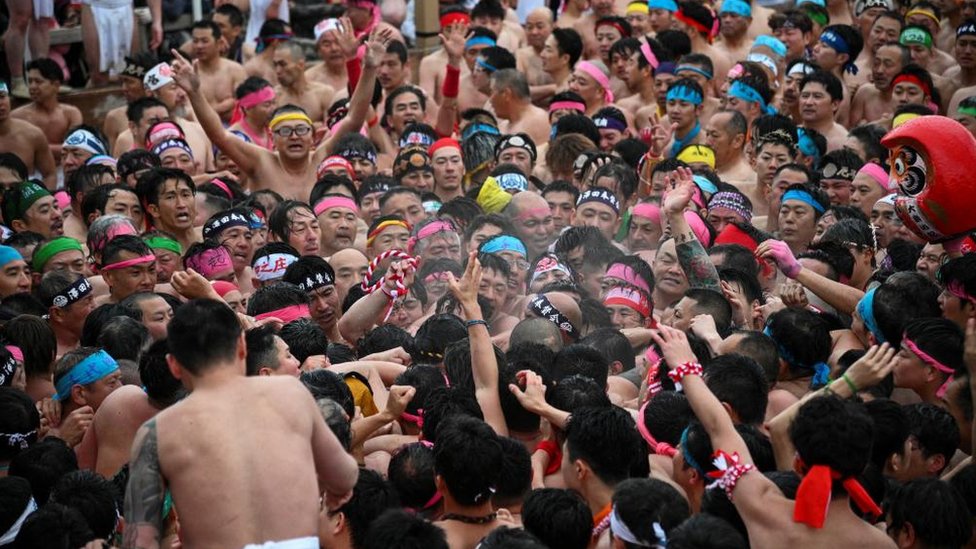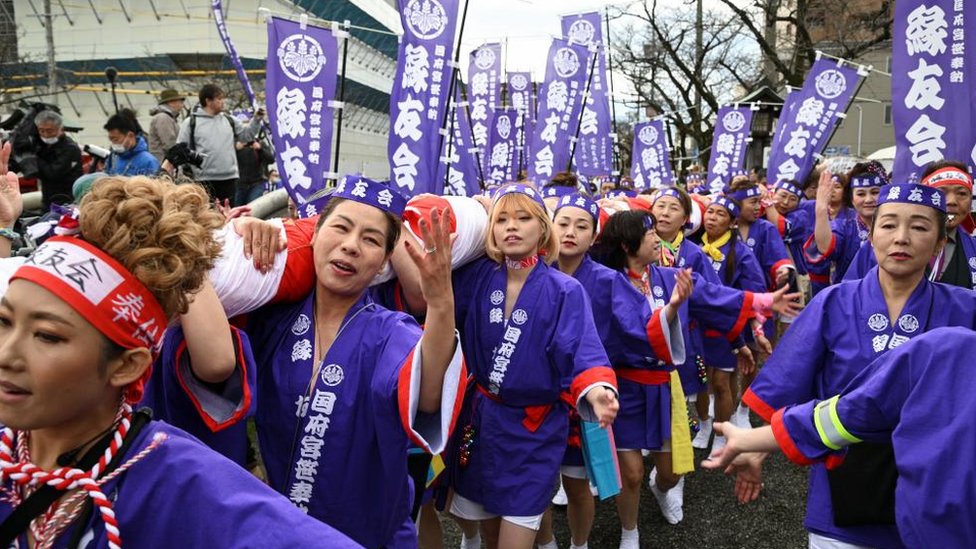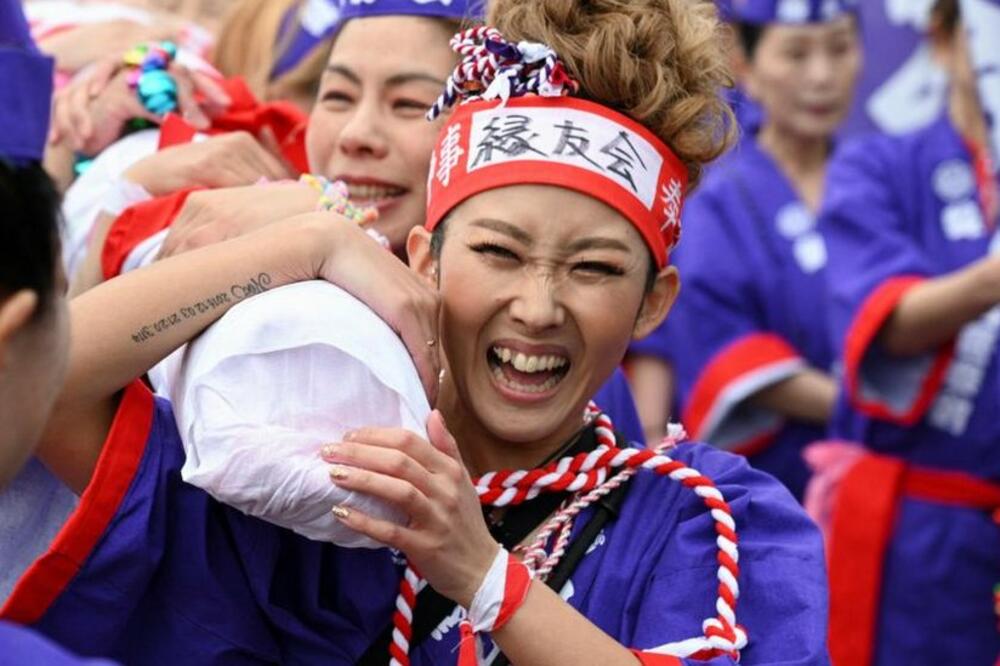A sea of chants, almost naked men fight and push towards the shrine, shouting “washoi! váchoi!" (let's go, let's go).
It's a scene that has barely changed in the 1.250 years that the Hadaka Matsuri, or Naked Festival, has been held at Konomiya Shrine in central Japan.
But this year there is a big change.
Away from the gathered men, there is a group that will become the first female in the history of this festival.
The women who came to participate are aware that they are writing history.
In much of the world, it's hard for women to find a place in traditionally male-dominated fields and customs, but in Japan - which last year ranked 125th out of 146 on the World Economic Forum's Gender Gap Index - it's especially difficult.
- Ikigai: This is why the Japanese get up every morning and look forward to life
- The geisha of Niigata: "Other" Japanese geishas
- In photos: How Japan celebrates Coming of Age Day
- Should we eat like the Japanese to live longer?
It's not that women haven't always been a part of this festival, but from the shadows.
"Women have always worked very hard to prepare and support the men at the festival," explains Atsuko Tamakoshi, whose family has worked at the Konomiya festival for generations.

But the idea of taking part in the festival - where men try to ward off evil spirits, before praying for good luck at a shrine - has never been floated before.
According to Naruhito Tsunoda, there was never an actual ban, it's just that no one ever asked.
And when they asked, the answer was easy.
"I believe that the most important thing is that there is a fun festival for everyone. I think even God would be the happiest about that," he told the Reuters news agency.
However, not everyone in the community was so sympathetic to the idea of women's participation.
"There were a lot of people who were worried (about our participation) and said, 'What are women doing at a men's festival?', 'This is a men's festival, this is a serious thing,'" said Tamakoshi, a 56-year-old grandmother.
"But we were all united in wanting to do this. We believed that God would take care of us if we were honest."
Watch the video: Mladen is the first Serbian samurai
The women waiting for their turn to participate in the festival are truly sincere. Except they're not naked.
Instead, many wear "hapi coats" - long, purple robes - and white shorts, unlike the men, who are bare to the rump, with what looks like a bamboo undergarment underneath.
They do not take part in the fighting, jostling and tumult characteristic of the men, who hurry to make their way to the shrine, climbing over each other to touch the Shin Otoko, or 'male deity' - the man chosen by the shrine.
Tradition says: if you touch it, you will ward off evil spirits.
However, the fact that they do not take part in the great fight to the temple does not take away from the importance of the moment.
"I feel that times have finally changed," Yumiko Fujii told the BBC.
"But at the same time, I also have a sense of responsibility," he adds.

By participating in the festival, these women, however, not only break gender barriers, but also maintain tradition.
Last week, another naked festival was held at the Kokuseki temple in northern Japan.
But, as reported, he was the last because there simply weren't enough young people to hold the festival, that is, the tradition.
- Strndžanje - an erotic Vlach custom between reality and myth
- Pelivani from Jedren - a symbol of strength and endurance
Japan has one of the fastest rates of population aging in the world.
Last year, for the first time, it was recorded that one in 10 people was 80 or older.
Meanwhile, the birth rate is just 1,3 per woman, with only 800.000 babies born last year.
The moment has come for the women to go to the sanctuary.
They stand in two parallel lines and carry long bamboo sticks wrapped in intertwined red and white ribbons.
Atsuko Tamakoshi leads the column - blowing a whistle to encourage rhythmic singing, reserved for men only for decades and centuries.
"Yours, yours," shout the women.

The women are focused on the moves and speed they've been practicing for weeks. They know they have to do this right.
Aware that the eyes of the media and spectators are on them, they smile while a mixture of nervousness and excitement is felt in the air.
Cheers can be heard from the crowd, some shouting "Gambate" or "keep going!" as they trudge through the freezing temperatures.
They enter the courtyard of the Konomiya Shinto shrine and, like the men, are splashed with cold water.
It seems to give them even more energy.
The women end the ceremony with a traditional greeting of two bows, two claps and one last bow.
And then, there is euphoria that proves how significant this moment was.
Women shout, jump and hug each other crying.
“Arigatogozaimasu! Arigato!" Thank you! Thank you! ", they say to each other as the audience applauds them.
"I burst into tears, tears just flowed. I was not sure that I would be able to participate, but now I feel joy. I succeeded," says Michiko Ikai.
As they exit the shrine, the women are stopped by spectators to take pictures with them and by the media who want to interview them.
They are happy to respond.

"I made it, oh how happy I am," Mineko Akahori told the BBC.
"I am really grateful that as a woman I could participate for the first time".
Minako Ando, her friend who also participated, adds that "it's great that she is among the first women to do this."
"Times are changing," says Hiromo Maeda.
Her family runs a local inn where for the last 30 years men have been getting refreshed.
"I think our prayers and wishes are the same. It doesn't matter if you are a man or a woman. Our passion is the same."
For Atsuko Tamakoshi, who played a key role in the festival, she reflects on what they all achieved together.
She is also emotional and relieved.
"My husband has always participated in this festival," she tells the BBC.
"And I, until today, was just a spectator. Now I am filled with gratitude and happiness."
Also watch this video: What traditional New Year's bathing looks like in Japan
Follow us on Facebook,Twitter i Viber. If you have a topic proposal for us, contact us at bbcnasrpskom@bbc.co.uk
Bonus video:




